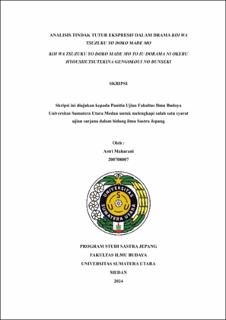Analisis Tindak Tutur Ekspresif dalam Drama Koi Wa Tsuzuku Yo Doko Made Mo
Analysis of Expressive Speech Acts in the Drama Koi Wa Tsuzuku Yo Doko Made Mo

Date
2024Author
Maharani, Astri
Advisor(s)
Hasibuan, Adriana
Alimansyar
Metadata
Show full item recordAbstract
This research discusses about analysis of expressive speech acts in the drama Koi wa Tsuzuku yo Doko Made mo. The expressive speech act is a speech that is spoken based on the speaker’s psychological state caused by a certain thing or situation that occurs between the speaker and the listener. The purpose of this research is to describe the forms and function of expressive illocutionary speech acts contained in the drama Koi wa Tsuzuku yo Doko Made mo. The data source used in this research is the drama Koi wa Tsuzuku yo Doko Made mo and the research data are the utterances containing expressive illocutionary speech acts in conversations between characters in the drama Koi wa Tsuzuku yo Doko Made mo from episode 1 to 3. The research methods used are qualitative descriptive method, observation method using uninvolved conversation observation technique and note-taking techniques, library research method, contextual analysis method, and informal method. The theory used in this research is expressive illocutionary speech acts pioneered by Searle and the theory of illocutionary speech act function by Leech. The result of this research shows that there are 15 data containing expressive illocutionary speech acts, including the form of thanks, the form of apology, the form of congratulations, the form of praise, and the form of complaining. Based on the analysis of speech act data, there are convivial illocutionary function and collaborative illocutionary function. In this drama, the form of expressive illocutionary speech act that appears the most often found is the expressive form of complaining and the expressive illocutionary function that appears the most often found is the function of convivial illocution.
Collections
- Undergraduate Theses [593]
